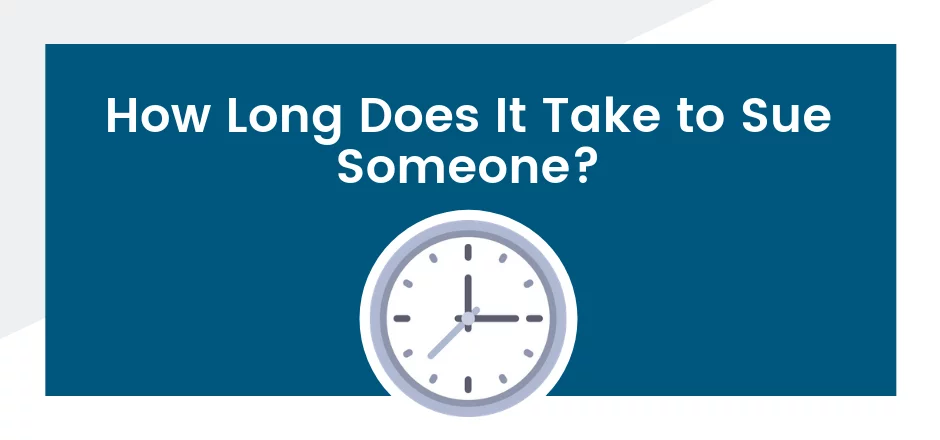How Long Does It Take to Sue Someone?
If you’re considering taking legal action against a person or company, you need to consider the time it takes to pursue legal action.
So, how long does it take to sue someone?
How Long Does It Take to Sue Someone?
Case specifics, such as what you are suing for (or being sued for) and the value of compensation being requested, can impact the length of time it takes to process your lawsuit through the civil court. Other less predictable variables, such as whether the other party cooperates or attempts to hide from the court, are difficult or even impossible to predict.
Given these influences, it is important to understand that the answers contained within this guide should not be considered legal advice. It can, however, help you to estimate the average length of time it takes to process similar lawsuits through California’s Civil Court.
Most courts, including the civil court, do follow a fairly reliable timeline if you look at statistics from past cases. We’ll start by discussing these timeframes first. Then, we’ll reveal how certain aspects of your case influence resolution times and what you can do to limit any potential holdups.
The Timeline for Civil Court
To better understand how long most civil court cases take to process in the state of California, we turn to the 2017 California Court Statistics Report. According to statewide statistics, the average time for a civil case to process from notice of appeal through to resolution is approximately 500 days (1.5 years).
However, this number is only an average. The same document reports that 90 percent of all cases filed are officially resolved within 842 days (around 2.5 years). Although this number might be significantly higher, it’s also much more likely to be accurate for predictions because it looks at the maximum resolution time for all cases, regardless of case specifics.
The 2017 California Court Statistics Report also indicates that your location can significantly impact how long it takes to process your case. Cases processed through the Sixth District in San Jose had a much, much longer median time of around 731 days, or around two years. This is over 300 days longer than the median average for Los Angeles despite the fact that San Jose has only 1/4 of the population.
A small number of lawsuits, including most class action lawsuits, lawsuits against the government, and lawsuits involving millions of dollars in compensation, can take significantly longer to process due to the level of information and evidence associated with them. According to the report, nearly all of these cases resolved within a maximum of five years.
Some Cases take Less Time
The statistics we listed above aren’t exact, but it’s safe to assume that most cases will resolve before the five-year mark. However, there are other influences that may result in faster processing times. This is why it’s not always easy to define how long it takes to sue someone.
First, nearly all cases involving between $10,000 and $25,000 in compensation are placed on California’s “Fast Track” system. This system ensures the case reaches trial within no more than 365 days after the initial lawsuit is filed by the plaintiff.
Cases involving more money, non-monetary compensation, or some other level of increased complexity in litigation are not fast-tracked. The evidence associated may require months or years of investigation.
Custody cases and divorce cases often process much faster through the civil court. This is both because they are so common (high-volume) and because of the need to limit indirect harm to children and/or ex-spouses. Failure to secure custody arrangements and/or alimony payments in a timely manner is almost always negative, especially when the parents involved disagree on the terms.
Similarly, personal injury and medical malpractice cases are often processed as quickly as possible. The individual suing may be seeking compensation for medical care and/or living expenses due to being unable to work. Or, they may be suing an insurance company to compel them to cover a certain treatment. It is in the best interest of everyone involved if a resolution comes quickly.
Still, even these more sensitive cases, a fast resolution is rare. The median time for these cases sits at around one to two years state-wide.
How Long Small Claims Court Takes
How long does it take to sue someone in small claims court?
Small Claims cases are also much more likely to process rapidly instead of taking several years to reach a culmination. This is because the average small claims lawsuit requires only a single court date; nearly everything else is handled outside of the courtroom by the defendant and/or the plaintiff.
In fact, Small Claims cases process so rapidly that the DCA reports most cases are heard, and resolved, within just 30 to 40 days. When these cases do require more time, it is almost always because the defendant cannot be located and/or actively avoids being served in a timely manner.
Expect Delays
Regardless of the type of lawsuit, or the location in which you file it, there are some delays that can occur despite your best intentions. Sometimes, courtroom availability is extremely low due to a high volume of cases or budget cuts. Lawyers on either side might also discover new evidence; organizing and submitting this newer evidence can take a significant amount of time.
Sometimes, a new and/or additional plaintiff or defendant is identified only after the case begins to process through the courts. When this happens, the courts grant both sides time to prepare and include the newly added party and any evidence they bring to the table. This alone may add months to your timeline.
Occasionally, a defendant may disappear, pass away, or otherwise become incapacitated (e.g, an illness or car accident) partway through the civil court process. While this usually results in an automatic win for the plaintiff, the courts will grant additional time if the inability to attend court is out of the defendant’s control.
Financial constraints on the part of the courts or the government may also cause significant delays. Under Government Code section 68106, courts have the right to reduce or limit services by closing courtrooms or clerks’ offices or reducing clerks’ office hours if and when such restrictions become necessary. A full list of all Reduced Court Services can be found at this link.
Conclusion
Now that you know how long it takes to sue someone, you can make a decision regarding whether or not suing someone is the right course of action for you.
If you’re still not sure about your particular legal matter, it may be a good idea to seek legal advice. You can do this by connecting with an experienced lawyer in your area. For the best results, we recommend finding a lawyer who has experience in the area of law pertaining to your legal matter.
Are you in search for a certified attorney to represent you?
Let us help you find one today!



